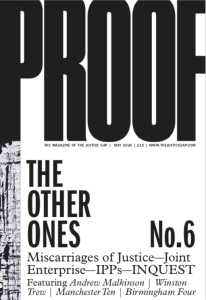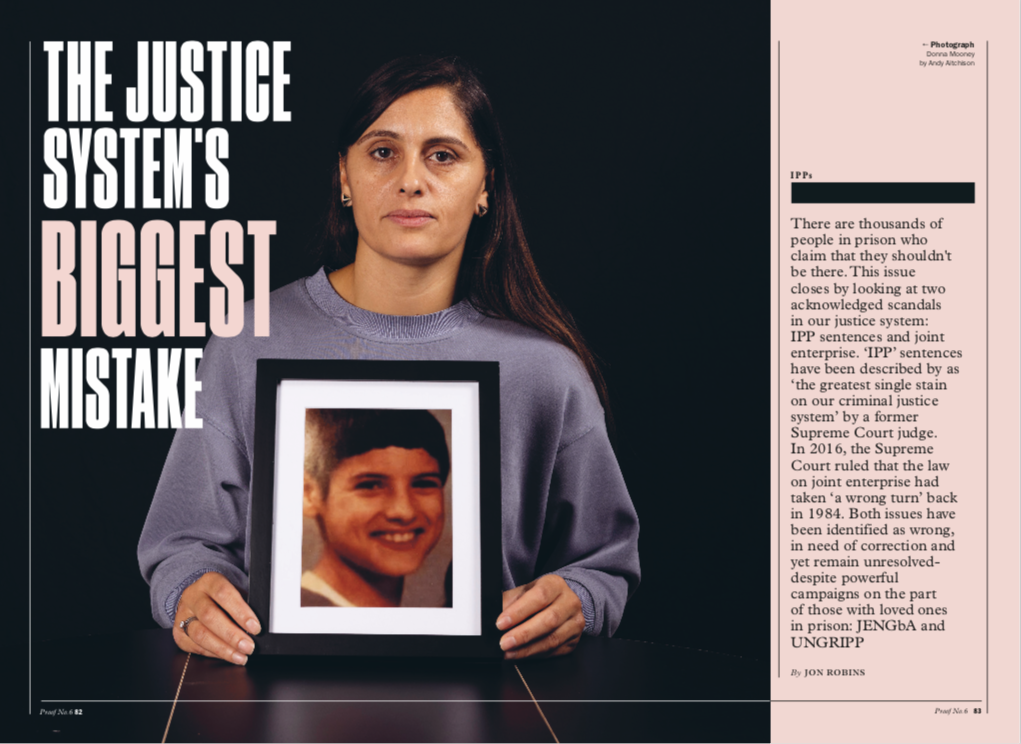Keir Starmer has been accused of ‘bottling it’ over a refusal to back a proposal to help prisoners on indeterminate sentences in a debate today on the Victims & Prisoners Bill. Shadow Home Affairs Spokesperson, Lord Ponsonby, was thought previously to have committed his party’s support for a key amendment to the Bill known as the ‘Simon Brown Memorial Amendment’ in recognition of the late former Supreme Court Justice who labelled Imprisonment for Public Protection sentences (IPPs) as the ‘greatest single stain on the British Justice system’.
- The image is from the latest issue of PROOF magazine and features Donna Mooney, sister of Tommy Nicol (Pic by Andy Aitchison)
 Campaigners now accuse the opposition of a u-turn. ‘Labour had a chance today to support a pretty modest change, and they bottled it,’ commented Richard Garside, director of the Centre for Crimes and Justice Studies. ‘Over many months, MPs, Peers, IPP prisoners and their families, and advocacy groups and campaigners, have worked tirelessly to craft numerous modest and incremental legislative changes to undo the toxic legacy of the awful IPP sentence.’
Campaigners now accuse the opposition of a u-turn. ‘Labour had a chance today to support a pretty modest change, and they bottled it,’ commented Richard Garside, director of the Centre for Crimes and Justice Studies. ‘Over many months, MPs, Peers, IPP prisoners and their families, and advocacy groups and campaigners, have worked tirelessly to craft numerous modest and incremental legislative changes to undo the toxic legacy of the awful IPP sentence.’
IPPs were introduced by New Labour in 2005 and scrapped in 2012 however that change was not retrospective (for more coverage of IPPs on the Justice Gap see here) . Garside continued: ‘Today’s Labour Party has a political responsibility to sort out what has become a lethal mess created by a previous Labour government. This is a really disappointing set back. The battle to end the IPP sentence continues.’
Lord Blunkett, former Home Secretary and IPP’s architect, has repeatedly acknowledged the damage done by indeterminate sentences and taken responsibility for his role in that. ‘The injustice of those finding themselves still subject to the IPP/DPP sentence 12 years on from its abolition, is now well known and appreciated by everyone who understands the double-bind – the longer the agony continues, the more difficult rehabilitation becomes.’
The amendment proposed to reverse the Parole Board release test – so that the burden of proof determining whether a prisoner should be released would fall on the Parole Board, not the prisoner – and campaigners argued this could have led to much fairer release decisions for thousands of IPPs who otherwise would languish in prison for years to come.
Lord Moylan, who tabled the Simon Brown Memorial Amendment, said that he remained ‘committed to trying to correct the injustice of IPP. The Simon Brown Memorial Amendment was a crucial opportunity to help nudge the dial in the right direction for IPP prisoner’.
Support the Justice Gap, buy Proof







